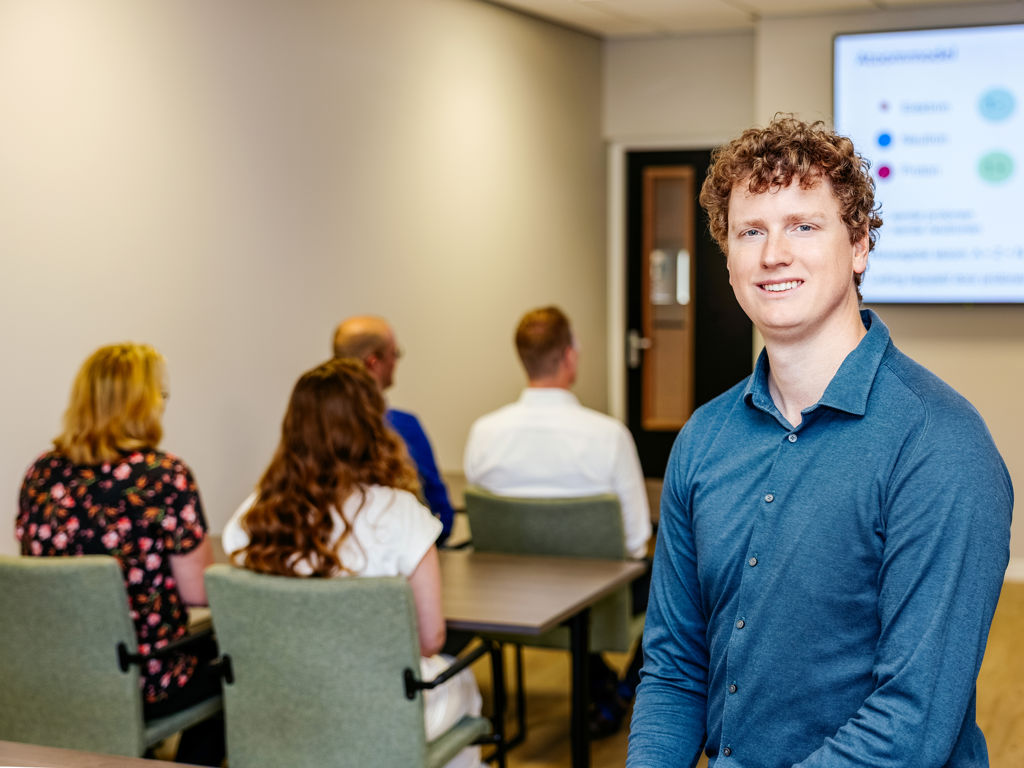‘I pass on what I’ve learned to others’
From performing brain scans in hospitals to checking food for contamination, thousands of professionals around the world work with radiation every day. That’s why it’s crucial that they know how to protect themselves and others from its potential risks. Last year, Berend Spruijt and his colleagues at the NRG PALLAS Academy trained more than 1,500 people to do just that.
Berend Spruijt
POSITION: Radiation safety trainer
TEAM: NRG PALLAS Academy
JOINED NRG PALLAS IN: 2024


Berend's expertise comes from years of experience working with radiation in hospitals. It’s a specialised field. ‘Radioactive substances aren’t the only sources of radiation. Medical equipment, such as X-ray and CT scanners, also emits it. This kind of radiation is powerful enough to harm your health. So you need to know exactly what you’re doing,’ he says. He spent many years as a medical imaging specialist in the nuclear medicine department. ‘I carried out diagnostic tests on patients, such as bone, heart and brain scans. It was incredibly meaningful work!’
Challenging material
Nevertheless, Berend began to feel restless. ‘At the time, I was supervising interns, and I realised how much energy it gave me. What I really wanted was to share my knowledge and help others feel confident about working safely.’ This insight led him to the NRG PALLAS Academy, the training institute of NRG PALLAS. As a radiation protection instructor, he now teaches colleagues and professionals from other organisations how to handle radiation safely and manage the risks. ‘The theory isn’t easy. There’s a lot to cover: legislation, dose limits and strict safety protocols. So I try to lighten the mood where I can, with videos and the occasional joke.’
Radioactive pancake
Berend brings his lessons to life with real examples. He has plenty of stories and experiences from his time in the hospital to draw on. Take protective clothing, for example. ‘Accidents happen,’ he says. ‘I often talk about stomach examinations where patients had to eat a radioactive pancake. The radiation enabled us to track the movement of the food from the stomach to the intestines, allowing us to check that everything was passing through properly. But if a patient suddenly became nauseous and the pancake came back up, I was always glad to be wearing the right protection.’
Explaining with care
In addition to theory, Berend teaches his students about behaviour and communication. ‘How do you talk to a colleague about unsafe practices? How do you reassure patients who are afraid of radiation? No question is too strange. I’m happy to explain something a dozen times if that’s what it takes for someone to really understand. When I see someone grow in confidence during a training session and walk out the door feeling self-assured, I know my work matters.’
Radiation is everywhere
Berend trains colleagues who work with isotopes produced by NRG PALLAS in the lab, during production and distribution. ‘They need to know exactly how to handle the radiation these isotopes emit. Their work directly impacts the quality of care for thousands of patients.’
"At NRG PALLAS, I work at the heart of nuclear medicine"
He also trains people from outside NRG PALLAS. ‘Radiation is found in a wide variety of sectors, from laboratories and dental clinics to industry and prisons. For example, X-ray cameras are used in road construction to measure the thickness of asphalt, which is vital for road safety. I also work with people from the food industry who use radiation to check for contaminated particles in products such as coffee beans.’
Back to the source
‘At NRG PALLAS, I work at the heart of nuclear medicine. We produce life-saving substances, the very same ones I used in the hospital. It’s incredibly rewarding to be now training others to use radiation safely. This way, I’m contributing to safety in healthcare. And I get to do that for 30,000 people every day.’